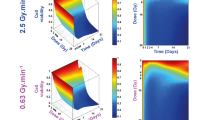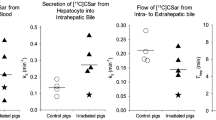Abstract
SYMPTOMS after exposure of the abdominal region of rats to X-radiation doses of 1,000 r., or greater, almost invariably include diarrhœa beginning at 3 days after X-ray irrespective of the doso. If death does not occur within the next 3 or 4 days there is a rapid improvement and the diarrhœa stops. Both the early onset and rapid improvement are usually attributed to the short turnover-time of the epithelial cells of the intestine. However, when the biliary flow was interrupted by ligation or cannulation of the common bile duct the incidental observation was made that diarrhœa did not occur1,2.
This is a preview of subscription content, access via your institution
Access options
Subscribe to this journal
Receive 51 print issues and online access
$199.00 per year
only $3.90 per issue
Buy this article
- Purchase on Springer Link
- Instant access to full article PDF
Prices may be subject to local taxes which are calculated during checkout
Similar content being viewed by others
References
Jackson, K. L., and Entenman, C., Rad. Res., 10, 67 (1959).
Sullivan, M. F., Amer. J. Physiol., 201, 951 (1961).
Author information
Authors and Affiliations
Rights and permissions
About this article
Cite this article
SULLIVAN, M. Dependence of Radiation Diarrhœa on the Presence of Bile in the Intestine. Nature 195, 1217–1218 (1962). https://doi.org/10.1038/1951217b0
Issue Date:
DOI: https://doi.org/10.1038/1951217b0
This article is cited by
-
Role of nutritional intervention in patients treated with radiotherapy for pelvic malignancy
British Journal of Cancer (2004)
-
Prophylaxe und Therapie akuter Strahlenfolgen an Haut und Schleimhaut
Strahlentherapie und Onkologie (1998)
-
Protection against gastrointestinal effects of whole-body X-irradiation by a bile acid sequestrant in rats
Experientia (1972)
-
Effect of a Diet containing Sodium Deoxycholate on the Intestinal Mucosa of the Mouse
Nature (1964)
Comments
By submitting a comment you agree to abide by our Terms and Community Guidelines. If you find something abusive or that does not comply with our terms or guidelines please flag it as inappropriate.



